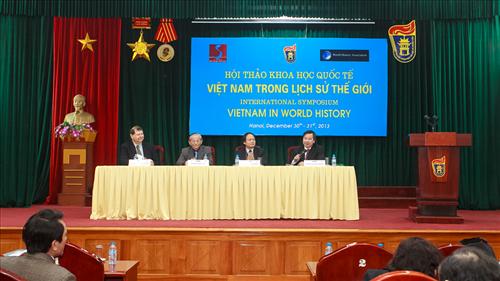In his opening speech at the conference, Prof. Dr. Nguyen Van Khanh (Rector of the University of Social Sciences and Humanities) spoke about the important role of historical science in promoting awareness and development in Vietnam in the past and present. The important achievement of historical science in the past 50 years is to determine the position and role of Vietnam in the region and the world, contributing to establishing Vietnam's dynamic integration into the international exchange network. Thanks to this integration, Vietnam has had strong exchanges and transfers with the outside world in terms of economy, culture, religion, ideology, technology, etc. In fact, Vietnam has had early connections with other countries due to its important position on the regional and international trade route. Since 1986, thanks to strong innovation and reform, Vietnam has continued to become the center of attention of the world community.

Prof. Dr. Nguyen Van Khanh spoke at the opening session.
The Rector highly appreciated the significance of the conference, emphasizing the interdisciplinary and multidisciplinary nature of Vietnam studies at this conference. This is an opportunity for many generations of Vietnamese and world historians to discuss and share their understanding of Vietnam from many different perspectives and approaches in comparison and connection with world history.
Representing the World Historical Association, Prof. Marc Jason Gilbert spoke about the appeal and challenges of studying the current process of innovation and reform in Vietnam from a global perspective. He also said that there should be closer connections and exchanges between Vietnamese and international scientists to share and create connections and deep understanding in science and practice.

Professor Marc Jason Gilbert
The conference also heard the guiding speeches of Prof. Phan Huy Le (Chairman of the Vietnam Historical Science Association) on the main theme of this conference. The speech focused on the thesis: The history of Vietnam as a nation-state is always a part of world history. Research and perception of Vietnam, if separated from regional and world relations, will lead to subjective and one-sided assessments. Therefore, in order to contribute to a profound and comprehensive view of Vietnam in relation to the world, it is necessary to share research results between domestic and international historians.
After the opening session, delegates discussed in 8 sessions.
Session 1: The Chinese in Vietnam; The development and decline of the Cham world; Mobilizing resources to support the war effort for the Second Indochina War (1954-1975).
Session 2: Trade, navigation and political issues in the “Asiatic Mediterranean” region; The Cham world – changes over time; Educational policy as a foundation and bridge between cultures.
Session 3: The post-war world shaping the first and second Indochina wars; Development issues – from village to nation; Land reform as an aspect of Vietnamese history.
Session 4: Intercultural exchange and national integration in a global world; Fundamental issues in Vietnam's wartime history (1954-1975); Near and far - positive influences on Vietnam's neighborly relations.
Session 5: Maritime trade and politics in the “Asian Mediterranean” region; From war to peace – dimensions of international conflict; Colonialism – gender and identity.
Session 6: Official and unofficial diplomacy and world wars; Cultural adaptation in Vietnamese history; Global legacies of the war in Indochina – political and cultural issues.
Session 7: Modern issues; Colonialism and liberation movements in Southeast Asia in a comparative approach; Formation of the Vietnamese State from a world historical perspective.
Session 8: Vietnam in spatial and temporal dimensions; Vietnam in recent world history; Teaching history at university level.



